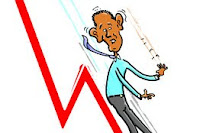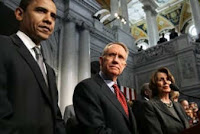[Pearce Godwin] The August Slide: Health Care & Obama
1 view
Skip to first unread message
Pearce Godwin
Sep 3, 2009, 1:32:33 AM9/3/09
to pearceb...@googlegroups.com
 August has been a great month for Democracy, an active, passionate and vocal democracy, very American and created by a perfect storm that has resulted in the President suffering a precipitous fall in public opinion and his signature policy initiative going on life support in one of the "most rapid turnabouts in recent American political history." All Presidents fall at the end of their honeymoon, but no president has ever fallen this far this fast. The "August Slide," as David Brooks calls it, is not personal. Pollster Glen Bolger observes that the major hit Obama has taken in the past month is a function of a populace that still likes the President as an inspiration figure and positive image on the foreign state but is growing very skeptical and quite wary of his big government policies, as well as his leadership, down 19 points from January. The health care debate "is at the fault line" of a larger debate about the role of government. The damaging path of the debate caught Obama by surprise, and Charlie Cook believes the situation has "slipped completely out of control" for the President and Democrats.
August has been a great month for Democracy, an active, passionate and vocal democracy, very American and created by a perfect storm that has resulted in the President suffering a precipitous fall in public opinion and his signature policy initiative going on life support in one of the "most rapid turnabouts in recent American political history." All Presidents fall at the end of their honeymoon, but no president has ever fallen this far this fast. The "August Slide," as David Brooks calls it, is not personal. Pollster Glen Bolger observes that the major hit Obama has taken in the past month is a function of a populace that still likes the President as an inspiration figure and positive image on the foreign state but is growing very skeptical and quite wary of his big government policies, as well as his leadership, down 19 points from January. The health care debate "is at the fault line" of a larger debate about the role of government. The damaging path of the debate caught Obama by surprise, and Charlie Cook believes the situation has "slipped completely out of control" for the President and Democrats. Americans are waking up to the doublespeak the President and his Capitol Hill allies, to whom he has outsourced an inordinate amount of his policy formulation, continue to employ in frantically pushing their version of health care reform; Time calls these obvious paradoxes the fatal flaw of ObamaCare. The WSJ also describes the President's many contradictions, pointing out that voters aren't stupid and it's because they are listening that ObamaCare is in trouble. As the White House likes to say, "facts are stubborn things." Notice we haven't heard much from Obama lately about his unequivocal promise that "if you like your insurance, if you like your doctor, you can keep them." Why? It turns out saying something over and over with increasing force and conviction does not make it true. The Levin Group, in a major analysis of the bill, estimates that 83 million people would be forced onto the "public option" under Obama's plan, losing their current, private coverage. Truly, no study was necessary to see the fallacy in Obama's claim. His purpose is sweeping health care reform that would transform the entire system... yet no individual would need to change their coverage. It's difficult to enact fundamental change if none of the players in the system change their behavior. Many Americans saw the wool being pulled over their eyes and reacted indignantly.
Speaking of wool being pulled over our eyes. Can we put to bed the debate about whether or not ObamaCare with a public option, not only would, but is designed to lead to single-payer care? Over the course of the debate, Democrat after Democrat, including Obama, has been caught telling friendly crowds that that is indeed the whole idea. The public option, it turns out, was part of a grand strategy developed in 2007 as a "stealth single payer." Hillary Clinton's chief strategist says the public option "was always meant as a transition to single payer, not merely as an aid to competition with private insurers." Case closed.
Obama would prefer single-payer, so why use the public option to get to the liberals' dream? Krugman explains that "politically it's hard to do in one step." I wonder why... Perhaps because only 32% of Americans favor single-payer health care. The rest understand what it would mean. Liberal leaders are being forced to confront a centrist nation. Realizing they've been found out, and with a plurality now opposing the trojan horse, the public option looks increasingly less likely to be included in any reform that passes. Meanwhile, Pelosi says she can't pass a bill in the House without it. In case you've forgotten why conservatives oppose the public option, here's Heritage...
The bottom line is that a public plan will grant the federal government unprecedented power to constantly tinker with the health care sector in ways that will make one sixth of our entire economy completely dependent on decisions made in Washington, DC. This is not the way free societies operate.

Democrats would also like us to believe their sweeping reform would be deficit neutral as Obama has demanded. It was a rude awakening for them when the nonpartisan Congressional Budget Office scored their bills between $1 and $2 trillion dollars. Director Elmendorf said that rather than "bend the curve" on health care cost as Obama has promised, his proposals would "significantly expand the federal responsibility for health care cost." We are then to believe that health care and all of Obama's other big government initiatives can be paid for by pillaging the wealthiest Americans with a variety of surtaxes. The Washington Post has called this a "mirage." As Margaret Thatcher said of Socialism, "the problem... is that eventually you run out of other people's money."
Obama is right to preach the dangers of inaction on health care. Health care spending, especially in the form of entitlements, is on an unsustainable and dangerous path, one that could bring down the entire economy. However, the President loses me in using this fact as rationale for passing legislation that we now know would only make our bleak budget outlook much worse. CBO director Elmendorf told congress that ObamaCare would "put an additional long-term burden on top of an already unsustainable path." Indeed, doing nothing would be better than accelerating our dive into the red; 54% of Americans agree.
Time Magazine laid out the challenge for Obama very well:
The hard part is making sure that in transforming a system that is bankrupting the country, Washington doesn't create a new one that does it even faster. Or that in expanding health coverage to the minority of Americans who don't have it, Washington doesn't leave the majority who do have it — and who like what they have — with less.
Unfortunately, the President's proposals fail on both counts.

Obama and Democrats in Congress have simply lost credibility with the American people, including their strongest supporters. Republicans are not trusted much more, but have overtaken Democrats on the question for the first time in years. Only 27% of Americans believe members of Congress have a good understanding of the health care issue as they look to reshape one-sixth of the American economy; voters think they know the bill better. The polls were turning against the President in the early summer and by the end of July, only 36% thought ObamaCare was a good idea. Gallop presented the top 10 takeaways of public opinion on health care at the time and the numbers all look bad for the President. Obama's power has been dwindling ever since, leading some to conclude that he does not know how to legislate. In August, voters came to appreciate more of the reasons the plan is bad for America. At this point, Obama has been dealt a major blow in the polls with his approval dropping to 46% in one poll and losing 17 points with Independents.
The last hope for a bipartisan bill rests with six Senators on the Finance Committee, but talks appear to be breaking down on irreconcilable differences. Desperate to pass their signature piece of legislation, regardless of what the American people think, Democratic leaders on the Hill are considering twisting Senate rules to force through a bill with no Republican support, a move that many commentators believe would be ultimately suicidal. Mr. Obama's pledge to be a post-partisan president has quickly fizzled as he wages a permanent campaign, employing the politics of fear and blame, instead of governing. He is also providing a variant, incoherent message, the result of allowing focus groups to dictate his language. The carefully crafted phrases that Obama has used repeatedly have thus far not convinced a skeptical public. He now faces a "politically explosive mix of unpopular policies and an angered electorate." Some believe Obama's smartest move would be to "pull the plug on ObamaCare" and find an exit strategy in order to save his presidency, but I'm not holding my breath. He is indeed pushing ahead with a new strategy and plans to address a joint session of Congress next Wednesday night in an attempt to regain control of the debate.
Clearly a lot has transpired in Washington and around the country in the last month in the tumultuous world of health care reform. There is more to discuss, but it can wait until next week as I anticipate being able to post more regularly. We'll address the question of health care as a right and the co-ops alternative, look at the absurd reaction from the left to this great piece in the WSJ by the CEO of Whole Foods as well as cover the economy, the GOP and other issues that have been muffled by the town hall volume of health care in August.
In the meantime, cast your vote in the latest PG Polls: Do you think President Obama will sign a major health care reform bill this year? Will Obama ever fully recover from his downward slide?
--
Posted By Pearce Godwin to Pearce Godwin at 9/02/2009 07:58:00 PM
Reply all
Reply to author
Forward
0 new messages
